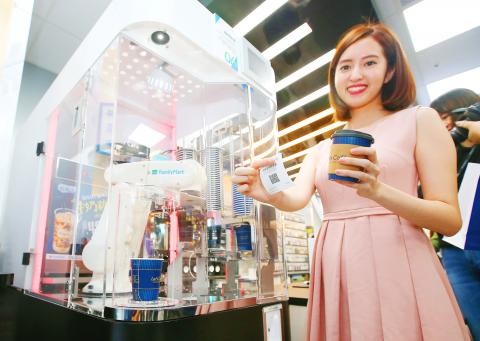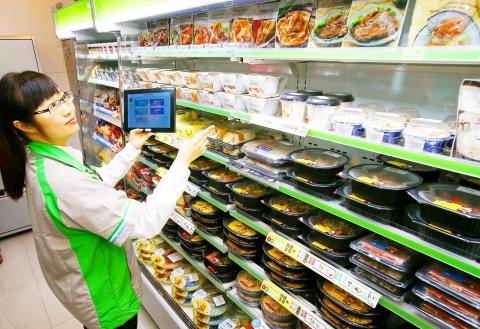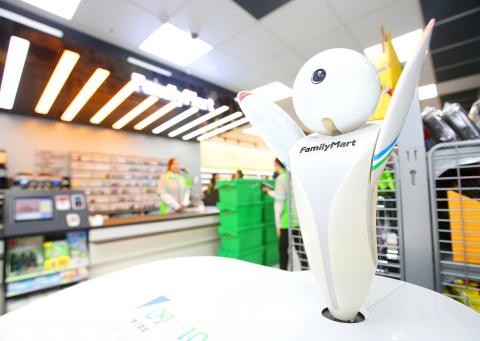Taiwan FamilyMart Co (全家便利商店) on Thursday last week launched a concept store in Taipei on the intersection of Chongqing S Road and Wuchang Street, beginning a field trial that aims to attract customers to the store while reducing the burden on staff by using digital technologies such as robots and blockchain technology.
The new store marks the beginning of Taiwan FamilyMart’s efforts to transform into a next-generation convenience store chain, the Chinese-language Liberty Times (the sister newspaper of the Taipei Times) reported.
In collaboration with Fujitsu Ltd, Microsoft Taiwan Corp (台灣微軟), Plenty Island Taiwan Corp (和椿科技), LWO Technology Co (凌暉科技), BenQ Corp (明基電通) and several other business partners, Taiwan FamilyMart wants to build an open platform where they can receive input from other industries to meet different demands, the newspaper reported.

Photo: CNA
Taiwan FamilyMart operates the nation’s No. 2 convenience store chain, with 3,168 stores as of Feb. 26, the company said on its Web site.
Taiwan FamilyMart said the concept store provides a unique customer experience, which includes a robot to guide customers around the store, a content delivery service and a video communication solution.
The store’s entrance counter is equipped with a 3D camera to count the number of store visitors, while the use of electronic price tags enables consumers to interact with point-of-sale registers while allowing the store to update stock information automatically, it said.

Photo: CNA
The concept store also uses digital technologies — including Internet of Things, big data, artificial intelligence, radio frequency identification, near-field communication and blockchain technology — to lessen staff members’ work burdens, from product ordering and goods receiving to item inspection and display, the newspaper said.
While FamilyMart is not planning to open cashier-free stores in the near future, it would add a self-checkout counter at the concept store in the second half of this year, the company said.
The company on Thursday reported a net profit of NT$1.41 billion (US$48.4 million) for last year, up 2.19 percent from the previous year, with record-high earnings per share of NT$6.3.

Photo: CNA
Consolidated revenue increased 6.38 percent annually from NT$60.57 billion to NT$64.43 billion, thanks to a better product portfolio and contributions from e-logistics businesses, the company said.
The company’s board has approved a cash dividend of NT$5.5 per share, equivalent to a payout ratio of 87.3 percent and a yield of 3.21 percent in terms of its closing share price of NT$171.5 on Saturday.

Quanta Computer Inc (廣達) chairman Barry Lam (林百里) is expected to share his views about the artificial intelligence (AI) industry’s prospects during his speech at the company’s 37th anniversary ceremony, as AI servers have become a new growth engine for the equipment manufacturing service provider. Lam’s speech is much anticipated, as Quanta has risen as one of the world’s major AI server suppliers. The company reported a 30 percent year-on-year growth in consolidated revenue to NT$1.41 trillion (US$43.35 billion) last year, thanks to fast-growing demand for servers, especially those with AI capabilities. The company told investors in November last year that

Intel Corp has named Tasha Chuang (莊蓓瑜) to lead Intel Taiwan in a bid to reinforce relations between the company and its Taiwanese partners. The appointment of Chuang as general manager for Intel Taiwan takes effect on Thursday, the firm said in a statement yesterday. Chuang is to lead her team in Taiwan to pursue product development and sales growth in an effort to reinforce the company’s ties with its partners and clients, Intel said. Chuang was previously in charge of managing Intel’s ties with leading Taiwanese PC brand Asustek Computer Inc (華碩), which included helping Asustek strengthen its global businesses, the company

Taiwanese suppliers to Taiwan Semiconductor Manufacturing Co. (TSMC, 台積電) are expected to follow the contract chipmaker’s step to invest in the US, but their relocation may be seven to eight years away, Minister of Economic Affairs J.W. Kuo (郭智輝) said yesterday. When asked by opposition Chinese Nationalist Party (KMT) Legislator Niu Hsu-ting (牛煦庭) in the legislature about growing concerns that TSMC’s huge investments in the US will prompt its suppliers to follow suit, Kuo said based on the chipmaker’s current limited production volume, it is unlikely to lead its supply chain to go there for now. “Unless TSMC completes its planned six

TikTok abounds with viral videos accusing prestigious brands of secretly manufacturing luxury goods in China so they can be sold at cut prices. However, while these “revelations” are spurious, behind them lurks a well-oiled machine for selling counterfeit goods that is making the most of the confusion surrounding trade tariffs. Chinese content creators who portray themselves as workers or subcontractors in the luxury goods business claim that Beijing has lifted confidentiality clauses on local subcontractors as a way to respond to the huge hike in customs duties imposed on China by US President Donald Trump. They say this Chinese decision, of which Agence